Global Business Environment: A PESTLE Analysis of Tesco's Strategy
VerifiedAdded on 2023/06/18
|6
|1245
|457
Report
AI Summary
This report provides a PESTLE analysis of Tesco, a leading UK retailer in Central Europe, to evaluate the external factors influencing its business decisions. The analysis covers political, economic, social, technological, legal, and environmental factors (PESTLE). It identifies opportunities for Tesco, such as expanding in developing markets and leveraging technology for sales, as well as threats like changing climatic conditions and legal compliance. The report concludes that while Tesco faces challenges, its strong economy and technological advancements position it for future success, with a focus on Corporate Social Responsibility (CSR) and environmental friendliness being crucial for maintaining customer loyalty and navigating the evolving business landscape.
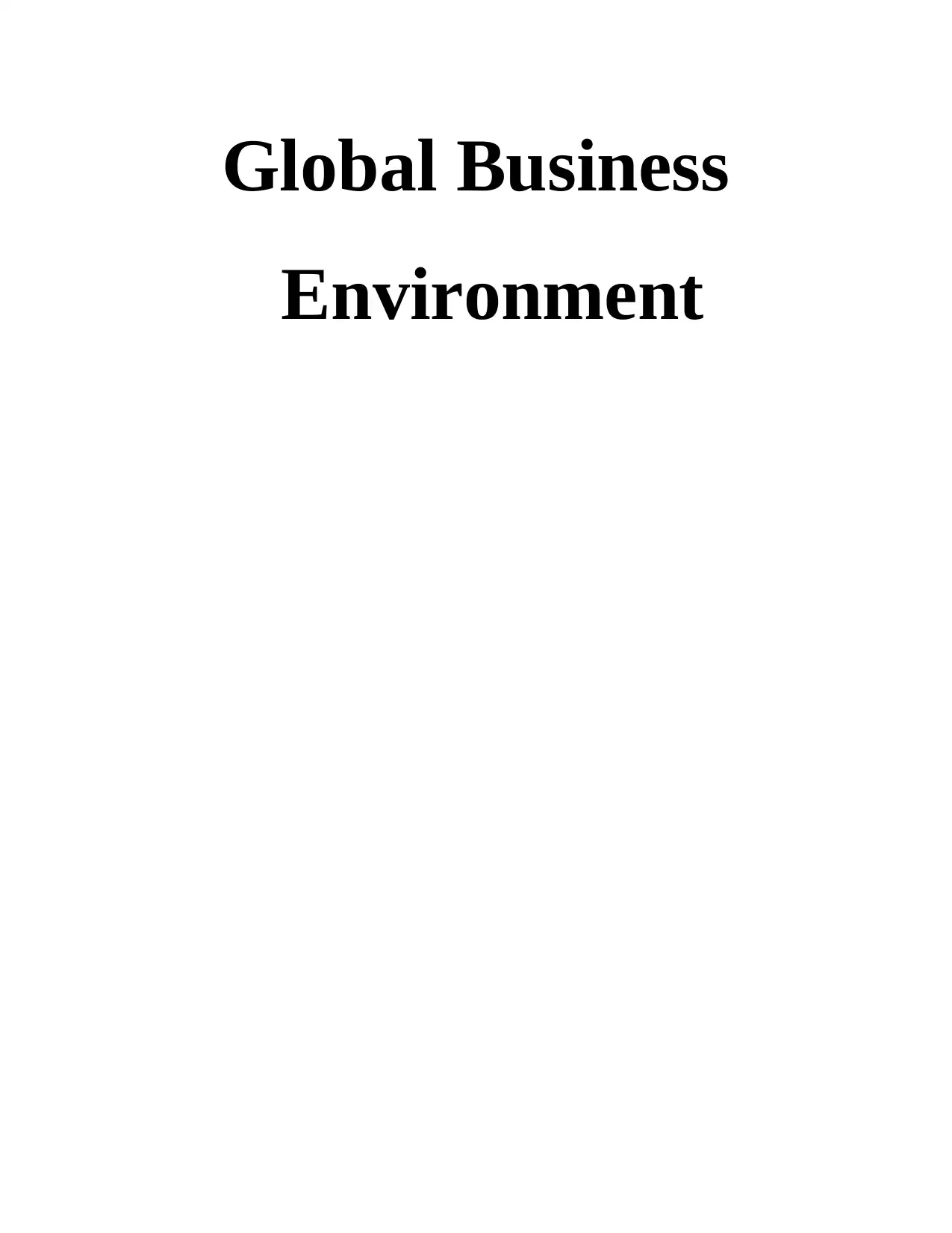
Global Business
Environment
Environment
Paraphrase This Document
Need a fresh take? Get an instant paraphrase of this document with our AI Paraphraser
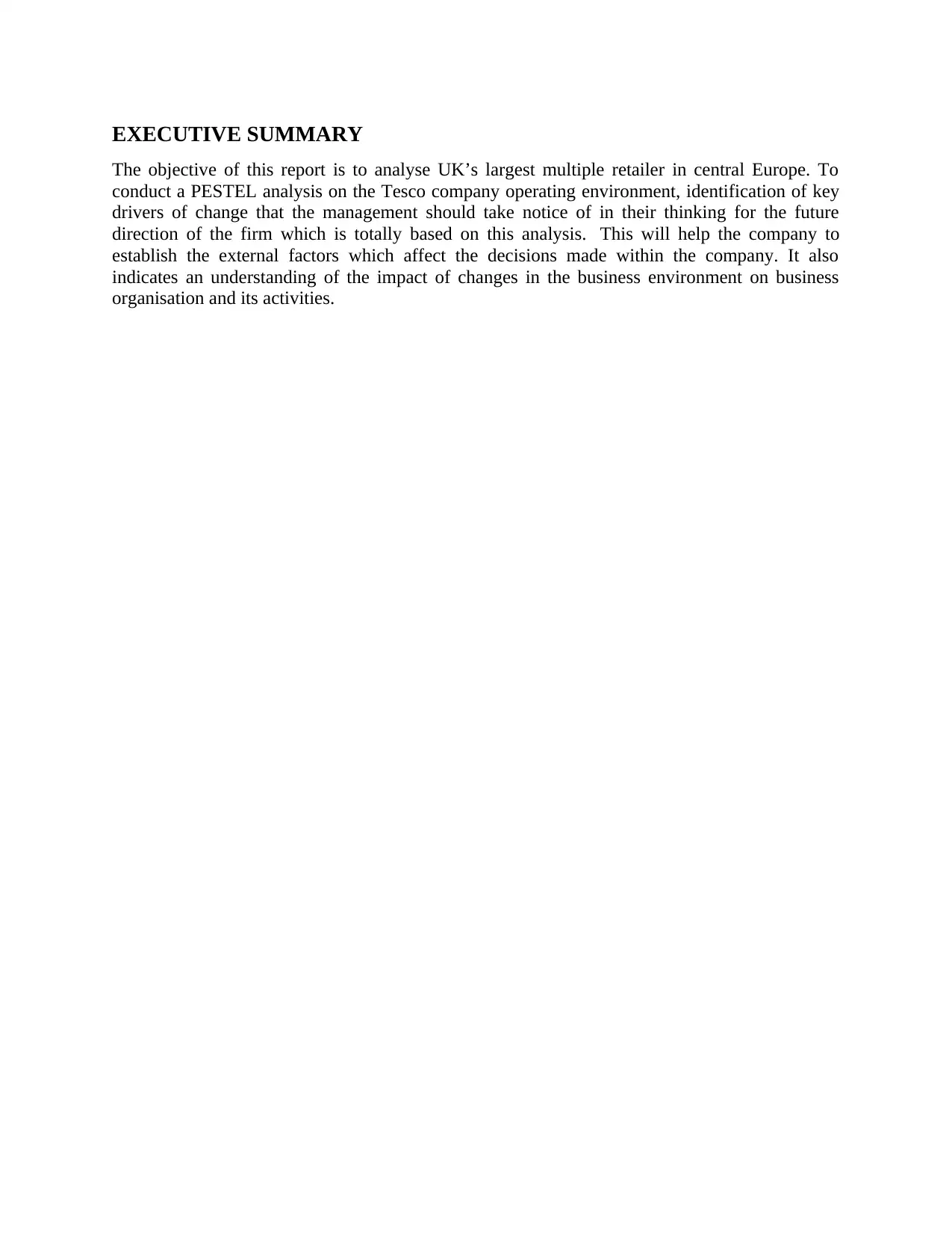
EXECUTIVE SUMMARY
The objective of this report is to analyse UK’s largest multiple retailer in central Europe. To
conduct a PESTEL analysis on the Tesco company operating environment, identification of key
drivers of change that the management should take notice of in their thinking for the future
direction of the firm which is totally based on this analysis. This will help the company to
establish the external factors which affect the decisions made within the company. It also
indicates an understanding of the impact of changes in the business environment on business
organisation and its activities.
The objective of this report is to analyse UK’s largest multiple retailer in central Europe. To
conduct a PESTEL analysis on the Tesco company operating environment, identification of key
drivers of change that the management should take notice of in their thinking for the future
direction of the firm which is totally based on this analysis. This will help the company to
establish the external factors which affect the decisions made within the company. It also
indicates an understanding of the impact of changes in the business environment on business
organisation and its activities.
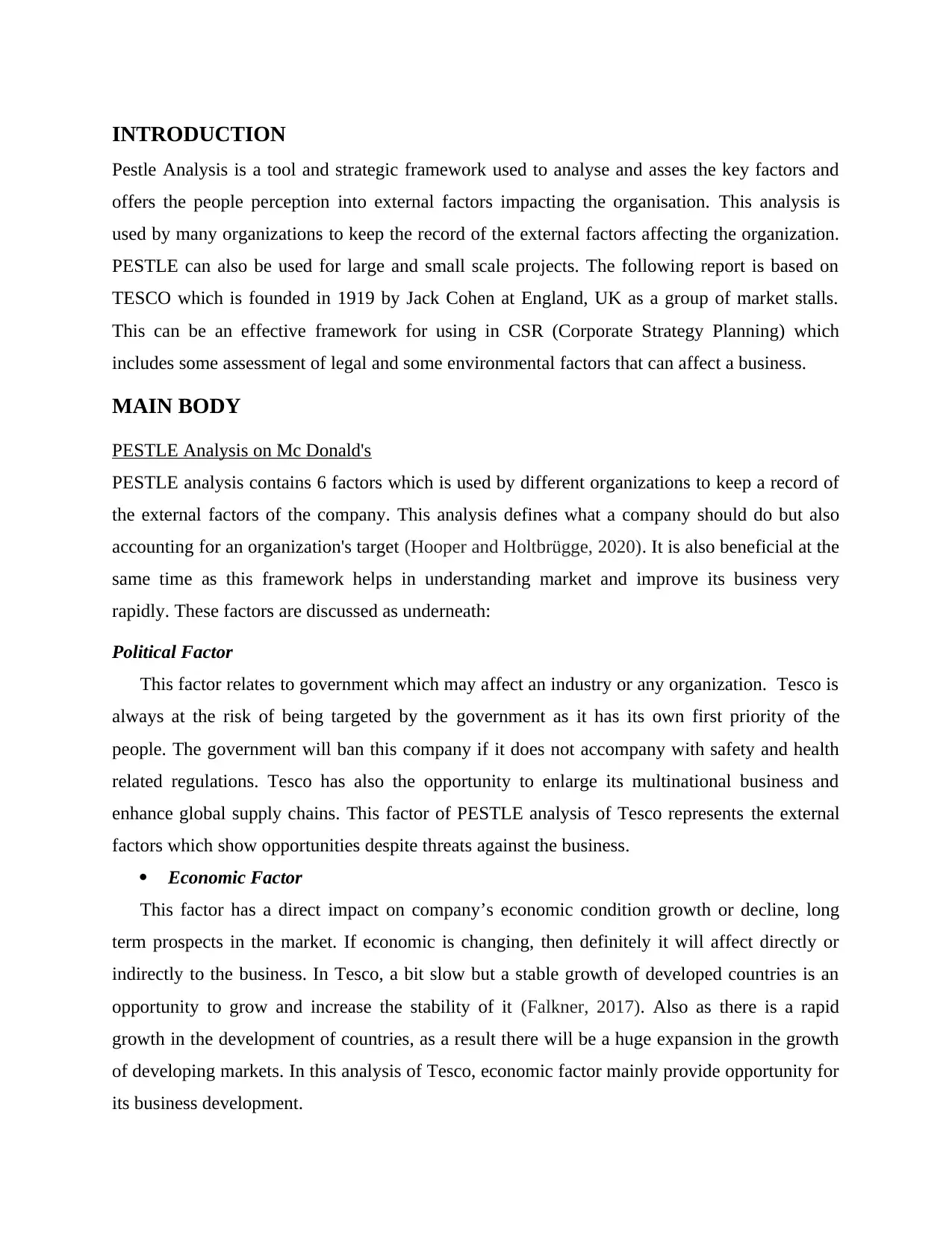
INTRODUCTION
Pestle Analysis is a tool and strategic framework used to analyse and asses the key factors and
offers the people perception into external factors impacting the organisation. This analysis is
used by many organizations to keep the record of the external factors affecting the organization.
PESTLE can also be used for large and small scale projects. The following report is based on
TESCO which is founded in 1919 by Jack Cohen at England, UK as a group of market stalls.
This can be an effective framework for using in CSR (Corporate Strategy Planning) which
includes some assessment of legal and some environmental factors that can affect a business.
MAIN BODY
PESTLE Analysis on Mc Donald's
PESTLE analysis contains 6 factors which is used by different organizations to keep a record of
the external factors of the company. This analysis defines what a company should do but also
accounting for an organization's target (Hooper and Holtbrügge, 2020). It is also beneficial at the
same time as this framework helps in understanding market and improve its business very
rapidly. These factors are discussed as underneath:
Political Factor
This factor relates to government which may affect an industry or any organization. Tesco is
always at the risk of being targeted by the government as it has its own first priority of the
people. The government will ban this company if it does not accompany with safety and health
related regulations. Tesco has also the opportunity to enlarge its multinational business and
enhance global supply chains. This factor of PESTLE analysis of Tesco represents the external
factors which show opportunities despite threats against the business.
Economic Factor
This factor has a direct impact on company’s economic condition growth or decline, long
term prospects in the market. If economic is changing, then definitely it will affect directly or
indirectly to the business. In Tesco, a bit slow but a stable growth of developed countries is an
opportunity to grow and increase the stability of it (Falkner, 2017). Also as there is a rapid
growth in the development of countries, as a result there will be a huge expansion in the growth
of developing markets. In this analysis of Tesco, economic factor mainly provide opportunity for
its business development.
Pestle Analysis is a tool and strategic framework used to analyse and asses the key factors and
offers the people perception into external factors impacting the organisation. This analysis is
used by many organizations to keep the record of the external factors affecting the organization.
PESTLE can also be used for large and small scale projects. The following report is based on
TESCO which is founded in 1919 by Jack Cohen at England, UK as a group of market stalls.
This can be an effective framework for using in CSR (Corporate Strategy Planning) which
includes some assessment of legal and some environmental factors that can affect a business.
MAIN BODY
PESTLE Analysis on Mc Donald's
PESTLE analysis contains 6 factors which is used by different organizations to keep a record of
the external factors of the company. This analysis defines what a company should do but also
accounting for an organization's target (Hooper and Holtbrügge, 2020). It is also beneficial at the
same time as this framework helps in understanding market and improve its business very
rapidly. These factors are discussed as underneath:
Political Factor
This factor relates to government which may affect an industry or any organization. Tesco is
always at the risk of being targeted by the government as it has its own first priority of the
people. The government will ban this company if it does not accompany with safety and health
related regulations. Tesco has also the opportunity to enlarge its multinational business and
enhance global supply chains. This factor of PESTLE analysis of Tesco represents the external
factors which show opportunities despite threats against the business.
Economic Factor
This factor has a direct impact on company’s economic condition growth or decline, long
term prospects in the market. If economic is changing, then definitely it will affect directly or
indirectly to the business. In Tesco, a bit slow but a stable growth of developed countries is an
opportunity to grow and increase the stability of it (Falkner, 2017). Also as there is a rapid
growth in the development of countries, as a result there will be a huge expansion in the growth
of developing markets. In this analysis of Tesco, economic factor mainly provide opportunity for
its business development.
⊘ This is a preview!⊘
Do you want full access?
Subscribe today to unlock all pages.

Trusted by 1+ million students worldwide
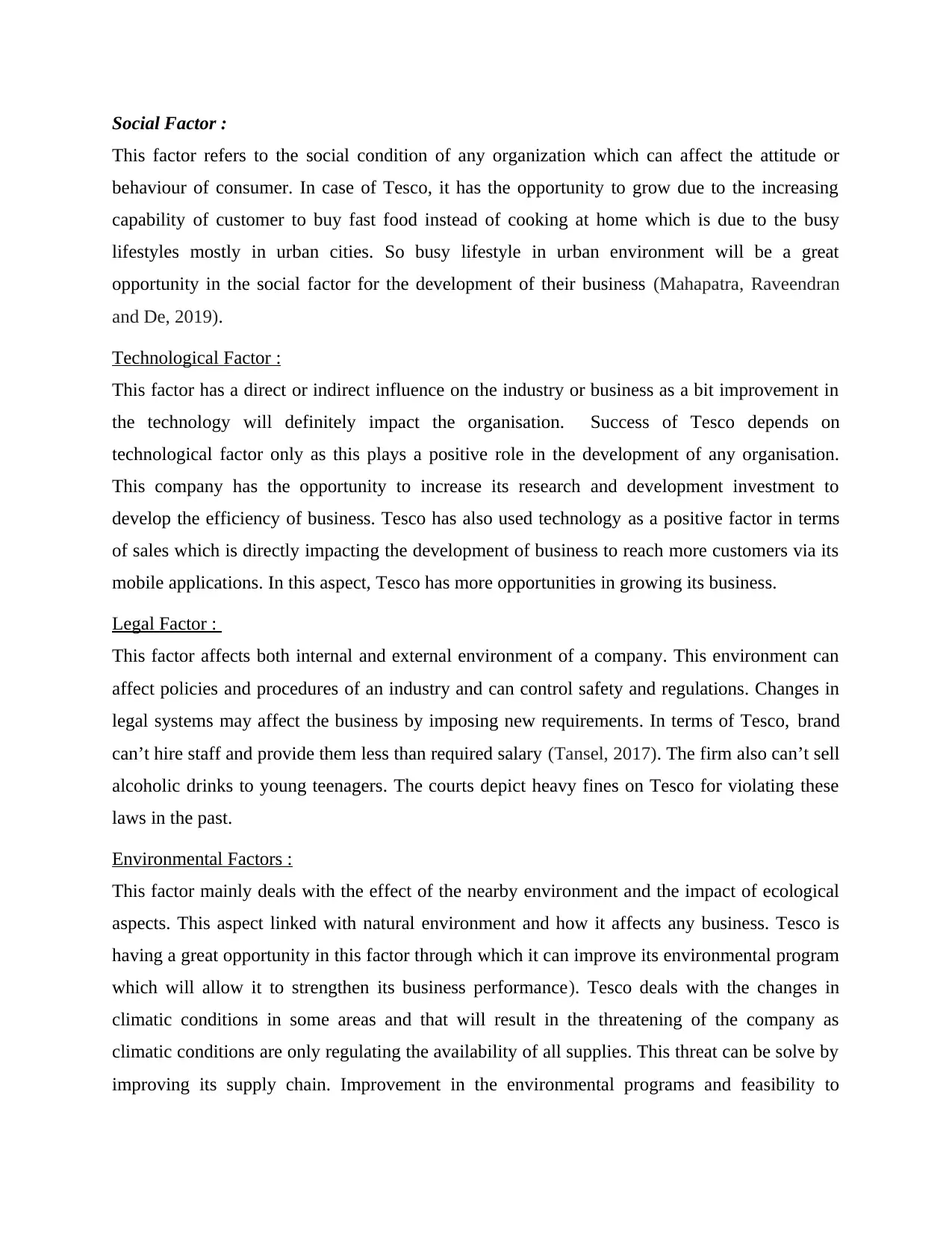
Social Factor :
This factor refers to the social condition of any organization which can affect the attitude or
behaviour of consumer. In case of Tesco, it has the opportunity to grow due to the increasing
capability of customer to buy fast food instead of cooking at home which is due to the busy
lifestyles mostly in urban cities. So busy lifestyle in urban environment will be a great
opportunity in the social factor for the development of their business (Mahapatra, Raveendran
and De, 2019).
Technological Factor :
This factor has a direct or indirect influence on the industry or business as a bit improvement in
the technology will definitely impact the organisation. Success of Tesco depends on
technological factor only as this plays a positive role in the development of any organisation.
This company has the opportunity to increase its research and development investment to
develop the efficiency of business. Tesco has also used technology as a positive factor in terms
of sales which is directly impacting the development of business to reach more customers via its
mobile applications. In this aspect, Tesco has more opportunities in growing its business.
Legal Factor :
This factor affects both internal and external environment of a company. This environment can
affect policies and procedures of an industry and can control safety and regulations. Changes in
legal systems may affect the business by imposing new requirements. In terms of Tesco, brand
can’t hire staff and provide them less than required salary (Tansel, 2017). The firm also can’t sell
alcoholic drinks to young teenagers. The courts depict heavy fines on Tesco for violating these
laws in the past.
Environmental Factors :
This factor mainly deals with the effect of the nearby environment and the impact of ecological
aspects. This aspect linked with natural environment and how it affects any business. Tesco is
having a great opportunity in this factor through which it can improve its environmental program
which will allow it to strengthen its business performance). Tesco deals with the changes in
climatic conditions in some areas and that will result in the threatening of the company as
climatic conditions are only regulating the availability of all supplies. This threat can be solve by
improving its supply chain. Improvement in the environmental programs and feasibility to
This factor refers to the social condition of any organization which can affect the attitude or
behaviour of consumer. In case of Tesco, it has the opportunity to grow due to the increasing
capability of customer to buy fast food instead of cooking at home which is due to the busy
lifestyles mostly in urban cities. So busy lifestyle in urban environment will be a great
opportunity in the social factor for the development of their business (Mahapatra, Raveendran
and De, 2019).
Technological Factor :
This factor has a direct or indirect influence on the industry or business as a bit improvement in
the technology will definitely impact the organisation. Success of Tesco depends on
technological factor only as this plays a positive role in the development of any organisation.
This company has the opportunity to increase its research and development investment to
develop the efficiency of business. Tesco has also used technology as a positive factor in terms
of sales which is directly impacting the development of business to reach more customers via its
mobile applications. In this aspect, Tesco has more opportunities in growing its business.
Legal Factor :
This factor affects both internal and external environment of a company. This environment can
affect policies and procedures of an industry and can control safety and regulations. Changes in
legal systems may affect the business by imposing new requirements. In terms of Tesco, brand
can’t hire staff and provide them less than required salary (Tansel, 2017). The firm also can’t sell
alcoholic drinks to young teenagers. The courts depict heavy fines on Tesco for violating these
laws in the past.
Environmental Factors :
This factor mainly deals with the effect of the nearby environment and the impact of ecological
aspects. This aspect linked with natural environment and how it affects any business. Tesco is
having a great opportunity in this factor through which it can improve its environmental program
which will allow it to strengthen its business performance). Tesco deals with the changes in
climatic conditions in some areas and that will result in the threatening of the company as
climatic conditions are only regulating the availability of all supplies. This threat can be solve by
improving its supply chain. Improvement in the environmental programs and feasibility to
Paraphrase This Document
Need a fresh take? Get an instant paraphrase of this document with our AI Paraphraser
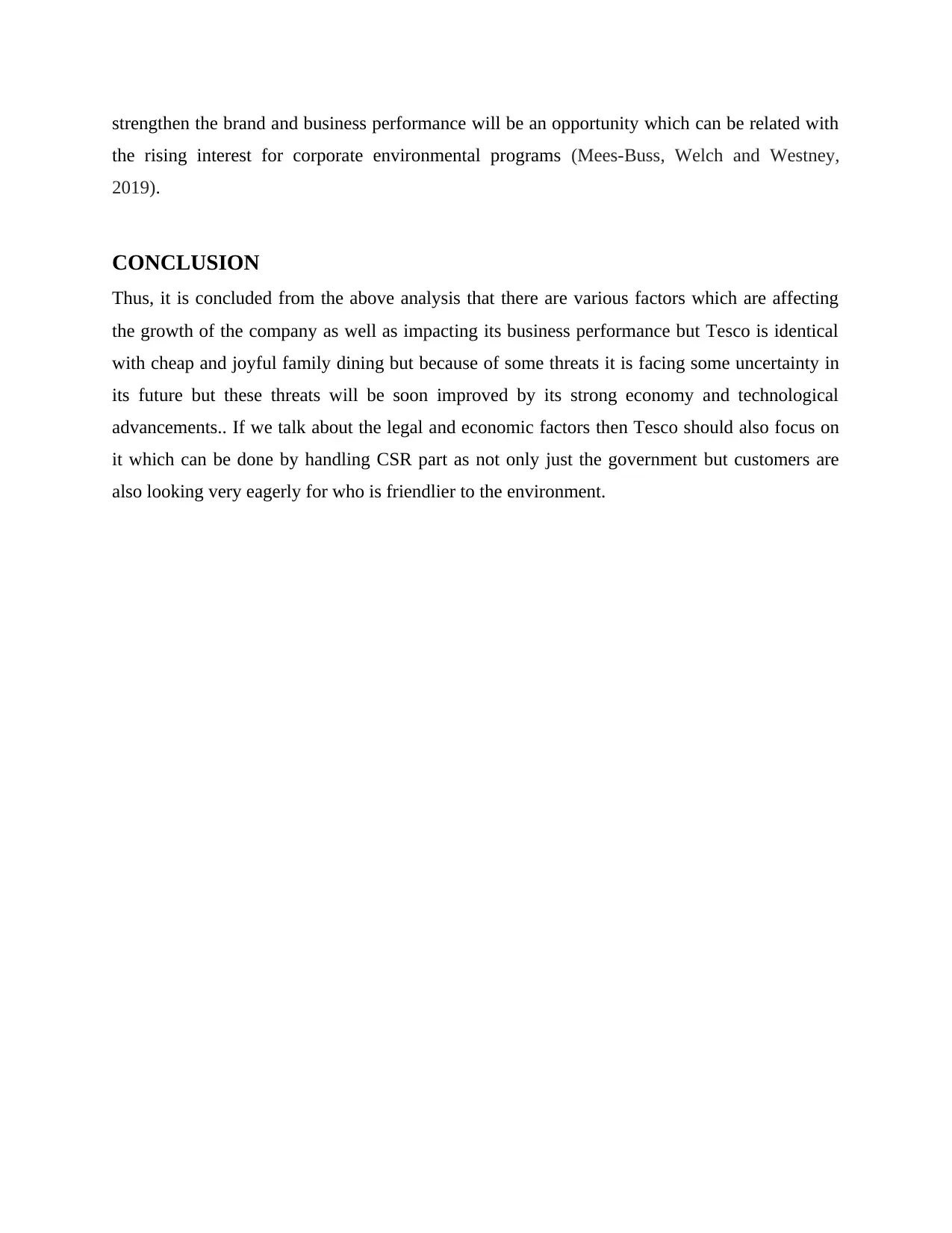
strengthen the brand and business performance will be an opportunity which can be related with
the rising interest for corporate environmental programs (Mees-Buss, Welch and Westney,
2019).
CONCLUSION
Thus, it is concluded from the above analysis that there are various factors which are affecting
the growth of the company as well as impacting its business performance but Tesco is identical
with cheap and joyful family dining but because of some threats it is facing some uncertainty in
its future but these threats will be soon improved by its strong economy and technological
advancements.. If we talk about the legal and economic factors then Tesco should also focus on
it which can be done by handling CSR part as not only just the government but customers are
also looking very eagerly for who is friendlier to the environment.
the rising interest for corporate environmental programs (Mees-Buss, Welch and Westney,
2019).
CONCLUSION
Thus, it is concluded from the above analysis that there are various factors which are affecting
the growth of the company as well as impacting its business performance but Tesco is identical
with cheap and joyful family dining but because of some threats it is facing some uncertainty in
its future but these threats will be soon improved by its strong economy and technological
advancements.. If we talk about the legal and economic factors then Tesco should also focus on
it which can be done by handling CSR part as not only just the government but customers are
also looking very eagerly for who is friendlier to the environment.
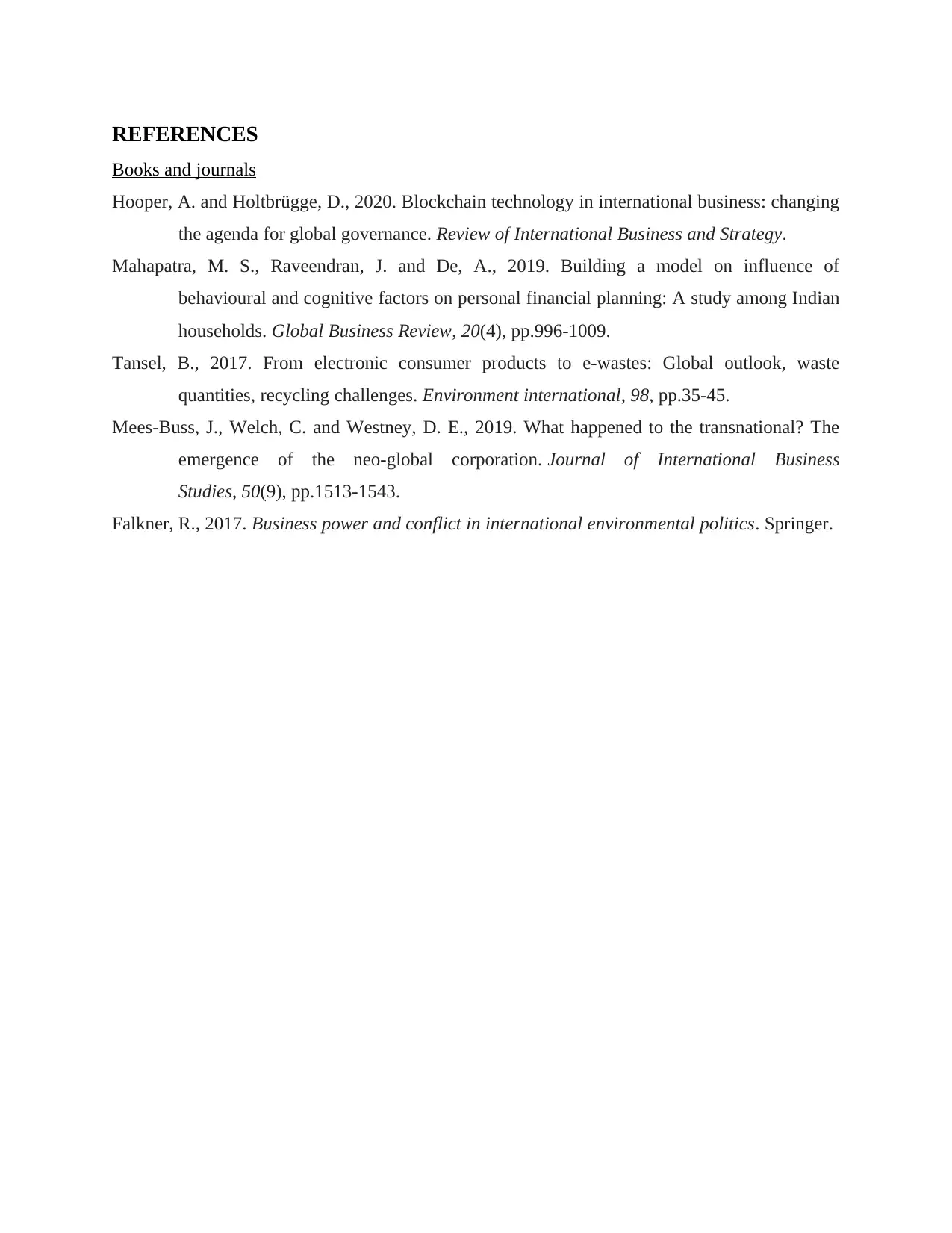
REFERENCES
Books and journals
Hooper, A. and Holtbrügge, D., 2020. Blockchain technology in international business: changing
the agenda for global governance. Review of International Business and Strategy.
Mahapatra, M. S., Raveendran, J. and De, A., 2019. Building a model on influence of
behavioural and cognitive factors on personal financial planning: A study among Indian
households. Global Business Review, 20(4), pp.996-1009.
Tansel, B., 2017. From electronic consumer products to e-wastes: Global outlook, waste
quantities, recycling challenges. Environment international, 98, pp.35-45.
Mees-Buss, J., Welch, C. and Westney, D. E., 2019. What happened to the transnational? The
emergence of the neo-global corporation. Journal of International Business
Studies, 50(9), pp.1513-1543.
Falkner, R., 2017. Business power and conflict in international environmental politics. Springer.
Books and journals
Hooper, A. and Holtbrügge, D., 2020. Blockchain technology in international business: changing
the agenda for global governance. Review of International Business and Strategy.
Mahapatra, M. S., Raveendran, J. and De, A., 2019. Building a model on influence of
behavioural and cognitive factors on personal financial planning: A study among Indian
households. Global Business Review, 20(4), pp.996-1009.
Tansel, B., 2017. From electronic consumer products to e-wastes: Global outlook, waste
quantities, recycling challenges. Environment international, 98, pp.35-45.
Mees-Buss, J., Welch, C. and Westney, D. E., 2019. What happened to the transnational? The
emergence of the neo-global corporation. Journal of International Business
Studies, 50(9), pp.1513-1543.
Falkner, R., 2017. Business power and conflict in international environmental politics. Springer.
⊘ This is a preview!⊘
Do you want full access?
Subscribe today to unlock all pages.

Trusted by 1+ million students worldwide
1 out of 6
Related Documents
Your All-in-One AI-Powered Toolkit for Academic Success.
+13062052269
info@desklib.com
Available 24*7 on WhatsApp / Email
![[object Object]](/_next/static/media/star-bottom.7253800d.svg)
Unlock your academic potential
Copyright © 2020–2026 A2Z Services. All Rights Reserved. Developed and managed by ZUCOL.




